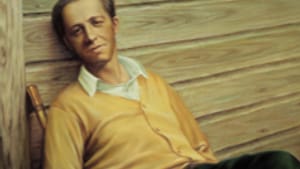Stay in the Loop
BSR publishes on a weekly schedule, with an email newsletter every Wednesday and Thursday morning. There’s no paywall, and subscribing is always free.
Music, politics and homoerotica:
A 20th Century journey
DAN COREN
Allow me the self-indulgence of suggesting that, here at the Broad Street Review, Robert Zaller, Beeri Moalem, Tom Purdom and I set an unusually high standard for musical journalism and criticism. There are days when I’m quite tastelessly infatuated with our collective wonderfulness. Well, I’ve just finished reading the perfect antidote to such unseemly pride: Alex Ross’s 543-page study (plus notes) of, as he puts it, “20th-Century classical composition.”
(Yes, I know, it’s been out since Christmas. But these days it takes me six months to get through a book like this.)
If you read The New Yorker, then you may have already concluded what has been obvious to me for years: Nobody writes more eloquently about music, especially contemporary music, than Ross. I stand in awe of his depth of knowledge and his lucid, conversational prose style.
The 15 chapters of The Rest is Noise begin with Richard Strauss’s Salome and end with John Adams’s Nixon in China. Even though he closes the book with a daunting depiction of the indecipherable turmoil that characterizes the compositional scene at this very moment, Ross somehow makes the journey hang together as a coherent narrative, one that’s just as much about European and American politics as it is about music. This narrative encompasses the chaos of the Weimar Republic; music under the yoke of Communism; the perversion of the German classical tradition by the Nazis; the socialistic bent of American music during the New Deal era; and the emergence of the avant-garde of Boulez and Stockhausen from the ruins of World War II.
Lukewarm about Schoenberg
In the course of the book, it becomes clear that Ross has his own personal pantheon of composers. It includes Strauss, Igor Stravinsky, Alban Berg, Jean Sibelius, Dmitri Shostakovich, Olivier Messaien, Steve Reich and Adams.
Ross, as he must, writes many pages about the influence of Arnold Schoenberg, but I sense that Ross really doesn’t particularly like Schoenberg’s music; it never inspires him to write the sort of lyrical, affecting prose that he uses, for example, to describe Copland’s Appalachian Spring:
“Copland conjures a perfect American Sunday … when the music of all peoples streams from a white-steepled church that does yet exist.”
For me, Ross’s greatest strength, in this book and in his writing in general, lies in his ability to make me want to hear music I don’t already know. Here is his description of the end of Messaien’s From the Canyon to the Stars, a work inspired by Utah’s Bryce and Zion Canyons:
“It is as if the composer were afraid to finish his creation, preferring to take refuge one more time in his beloved birdsong. … When the hunger for the missing chord becomes unbearable … there is a supernova of A major, billowing into the lowest and highest reaches of the orchestra and whiting out in fortissimo strings.”
Musicians in and out of the closet
The Rest is Noise is not without its quirkiness, however. Here and there— but also again and again— Ross devotes a great deal of attention to the subject of homosexuality. It is, to be sure, an unavoidable topic in any thorough discussion of Copland or Benjamin Britten. But the theme recurs so often that, by the end of the book, the reader has accumulated, in dribs and drabs, much more information than perhaps is necessary about the homoerotic affairs of many 20th-Century composers.
Ross also devotes what strikes me as an inordinate amount of attention to Britten, attention that’s that much odder when one realizes that Ralph Vaughan Williams isn’t cited even once in the book’s index. After hundreds of pages in which Ross takes great care not to swamp his reader with technical terminology, he devotes seven solid pages to a blow-by-blow musical account of Britten’s opera, Peter Grimes. Did Ross’s editor go on vacation that month? Did Ross even have the collaboration of an editor?
My wasted life?
In reading The Rest is Noise, it seems natural to yearn for musical examples, to feel the limitations of printed books about music. Not to worry: follow this link and you’ll find yourself at Ross’s personal website, where he provides a treasure-trove of audio examples and links supporting the print version of the book.
When I finished The Rest is Noise, I wrote, only half in jest, to an old friend of mine: “Ross makes me feel that I’ve wasted the last 20 years. Instead of all this obsessing about Mozart, Beethoven, and computer programs, I could have been listening to the music of Morton Feldman and Steve Reich.”
To read a reply, click here.
A 20th Century journey
DAN COREN
Allow me the self-indulgence of suggesting that, here at the Broad Street Review, Robert Zaller, Beeri Moalem, Tom Purdom and I set an unusually high standard for musical journalism and criticism. There are days when I’m quite tastelessly infatuated with our collective wonderfulness. Well, I’ve just finished reading the perfect antidote to such unseemly pride: Alex Ross’s 543-page study (plus notes) of, as he puts it, “20th-Century classical composition.”
(Yes, I know, it’s been out since Christmas. But these days it takes me six months to get through a book like this.)
If you read The New Yorker, then you may have already concluded what has been obvious to me for years: Nobody writes more eloquently about music, especially contemporary music, than Ross. I stand in awe of his depth of knowledge and his lucid, conversational prose style.
The 15 chapters of The Rest is Noise begin with Richard Strauss’s Salome and end with John Adams’s Nixon in China. Even though he closes the book with a daunting depiction of the indecipherable turmoil that characterizes the compositional scene at this very moment, Ross somehow makes the journey hang together as a coherent narrative, one that’s just as much about European and American politics as it is about music. This narrative encompasses the chaos of the Weimar Republic; music under the yoke of Communism; the perversion of the German classical tradition by the Nazis; the socialistic bent of American music during the New Deal era; and the emergence of the avant-garde of Boulez and Stockhausen from the ruins of World War II.
Lukewarm about Schoenberg
In the course of the book, it becomes clear that Ross has his own personal pantheon of composers. It includes Strauss, Igor Stravinsky, Alban Berg, Jean Sibelius, Dmitri Shostakovich, Olivier Messaien, Steve Reich and Adams.
Ross, as he must, writes many pages about the influence of Arnold Schoenberg, but I sense that Ross really doesn’t particularly like Schoenberg’s music; it never inspires him to write the sort of lyrical, affecting prose that he uses, for example, to describe Copland’s Appalachian Spring:
“Copland conjures a perfect American Sunday … when the music of all peoples streams from a white-steepled church that does yet exist.”
For me, Ross’s greatest strength, in this book and in his writing in general, lies in his ability to make me want to hear music I don’t already know. Here is his description of the end of Messaien’s From the Canyon to the Stars, a work inspired by Utah’s Bryce and Zion Canyons:
“It is as if the composer were afraid to finish his creation, preferring to take refuge one more time in his beloved birdsong. … When the hunger for the missing chord becomes unbearable … there is a supernova of A major, billowing into the lowest and highest reaches of the orchestra and whiting out in fortissimo strings.”
Musicians in and out of the closet
The Rest is Noise is not without its quirkiness, however. Here and there— but also again and again— Ross devotes a great deal of attention to the subject of homosexuality. It is, to be sure, an unavoidable topic in any thorough discussion of Copland or Benjamin Britten. But the theme recurs so often that, by the end of the book, the reader has accumulated, in dribs and drabs, much more information than perhaps is necessary about the homoerotic affairs of many 20th-Century composers.
Ross also devotes what strikes me as an inordinate amount of attention to Britten, attention that’s that much odder when one realizes that Ralph Vaughan Williams isn’t cited even once in the book’s index. After hundreds of pages in which Ross takes great care not to swamp his reader with technical terminology, he devotes seven solid pages to a blow-by-blow musical account of Britten’s opera, Peter Grimes. Did Ross’s editor go on vacation that month? Did Ross even have the collaboration of an editor?
My wasted life?
In reading The Rest is Noise, it seems natural to yearn for musical examples, to feel the limitations of printed books about music. Not to worry: follow this link and you’ll find yourself at Ross’s personal website, where he provides a treasure-trove of audio examples and links supporting the print version of the book.
When I finished The Rest is Noise, I wrote, only half in jest, to an old friend of mine: “Ross makes me feel that I’ve wasted the last 20 years. Instead of all this obsessing about Mozart, Beethoven, and computer programs, I could have been listening to the music of Morton Feldman and Steve Reich.”
To read a reply, click here.
Sign up for our newsletter
All of the week's new articles, all in one place. Sign up for the free weekly BSR newsletters, and don't miss a conversation.

 Dan Coren
Dan Coren
